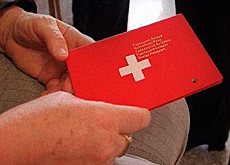
Naturalisation issue taken out of voters’ hands

Switzerland’s Federal Court has ruled against a proposal to subject citizenship applications by foreigners to the public vote.
The ruling came as Switzerland’s highest court also upheld an appeal by five applicants whose requests for Swiss citzenship were rejected in a popular vote in canton Lucerne.
The court ordered a review of the applications, which were turned down by the citizens of Emmen, an industrial suburb of Lucerne, in March 2000.
It said the applicants, all Yugoslav nationals, were victims of discrimination and that their constitutional rights were violated.
The people of Emmen won the right to vote on applications for citizenship in 1999.
Since then, 97 people have had their applications rejected. In 2000 alone, 39 out of 57 citizenship requests were rejected by Emmen voters.
Popular vote
Earlier on Wednesday, the court rejected as unconstitutional a proposal by the rightwing Swiss People’s Party to introduce a similar citizenship vote in Zurich.
It ruled that placing decisions on citizenship in voters’ hands contravened the federal constitution, as applicants had the right to present their cases and to be given reasons for refusal.
Hans Geser, a professor of sociology at Zurich University and an expert on local politics, says the system of using the popular vote on issues touching on human rights is unworkable, because a certain amount of regulation is required.
“This issue shows the limits to all decisions made by majority rule, because… a majority decision isn’t based on rules, it doesn’t have to be justified. It is its own justification,” he told swissinfo.
Informed decision
The court said meeting applicants’ rights would become especially difficult if large numbers of them came forward at once. Voters would be obliged to read a dossier on every applicant before casting their vote.
Geser says voters themselves do not want the burden of reading through all the documents.
“I think most citizens are not ready to commit themselves to these issues and to study the data on all the applicants in their community.”
The ruling could make it unconstitutional to use the ballot box to decide on naturalisation requests anywhere in Switzerland.
It is normally up to communal assemblies or committees to decide whether to put naturalisation application cases to the popular vote.
Spate of rejections
The Zurich branch of the Swiss People’s Party first put forward its proposal on citizenship applications in 1999.
The proposal was rejected first by the Zurich city authorities in January 2001, then by the government of canton Zurich in 2002.
The party then took its proposal to the Federal Court.
Complicated procedure
The application process for Swiss citizenship is often long and complicated.
Unless they are married to a Swiss national, applicants must live in Switzerland for a minimum of 12 years before applying for a Swiss passport. The procedure is also very expensive, without guarantees that the application will be successful.
As a result, Switzerland has one of the lowest levels of naturalisation in Europe.
Parliament is currently considering ways to simplify the naturalisation procedure, in particular for young second or third generation foreigners.
swissinfo with agencies
Switzerland’s highest court ruled that putting citizenship applications to the popular vote went against the federal constitution.
Normally, decisions on naturalisation are made by communal assemblies or committees.
Following the ruling, the Federal Court upheld an appeal made by foreigners in canton Lucerne, whose applications were turned down in a popular vote.
The five applications concerned will now be reviewed.

In compliance with the JTI standards
More: SWI swissinfo.ch certified by the Journalism Trust Initiative



























You can find an overview of ongoing debates with our journalists here . Please join us!
If you want to start a conversation about a topic raised in this article or want to report factual errors, email us at english@swissinfo.ch.